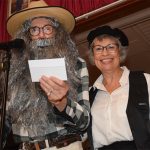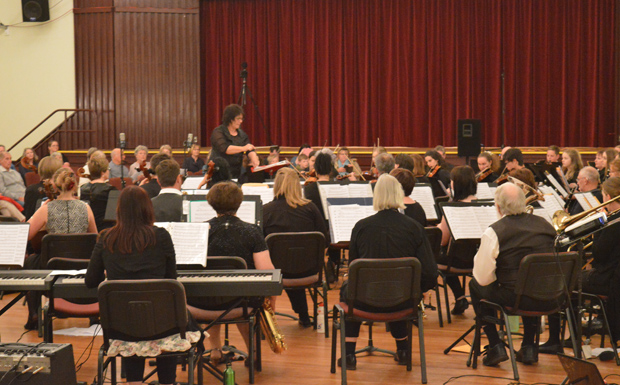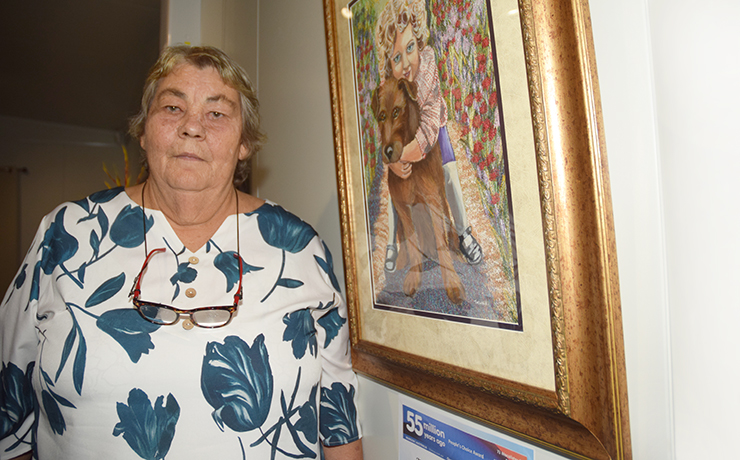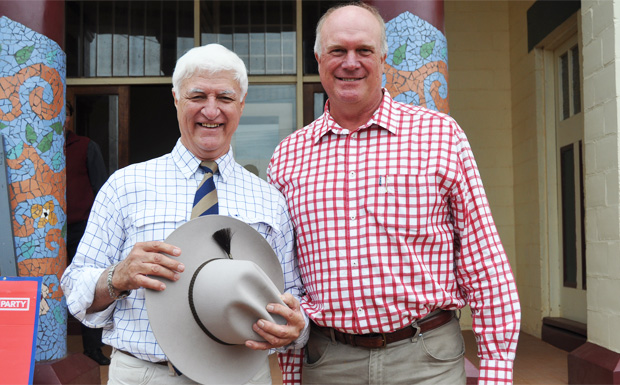
October 28, 2012
by Dafyd Martindale
Twenty-two South Burnett residents voted today at Wooroolin Hall to form a local branch of Katter’s Australian Party.
Party supporters and officials travelled from Gladstone, Maryborough, the Lockyer Valley and Brisbane to support the initiative, swelling the meeting attendance to about 50.
Party founder Bob Katter Jr – the Federal member for Kennedy since 1993 – also attended to explain his party’s values, answer questions from the floor and rally the faithful.
After a wide-ranging discussion that covered everything from privatisation of State assets to foreign ownership of land, turning back “the boats”, foreign workers, the “imminent collapse of the farming sector” and “the insatiable greed of the super rich”, 22 local party members voted to form a South Burnett branch.
Former KAP candidate for Nanango Carl Rackemann was elected Chairman; Trevor Keane as Vice-Chairman; Dennis Cotter as Secretary/Treasurer; and Ivan Nalder, Marilyn Newton and Rex Peterson as Executive Committee members.
As things turned out, the day’s star attraction was 90 minutes late due to a hold-up at the Blackbutt Range, but this didn’t appear to bother anyone as they chatted among themselves.
When Bob Katter finally arrived at 12:25pm, accompanied by KAP State Director Aidan McLindon and party membership officer Chris Green, the audience quickly found their seats.
They sat attentively for the next hour while Bob Katter outlined his views on what was wrong with the country and what Katter’s Australian Party could do to fix it.
Early in his talk, Mr Katter made it clear the party’s next target is the Federal Election, which will need to be held within 12 months.
He said KAP’s key goal was to gain the balance of power in the Senate.
Mr Katter reminded the audience that the former Country Party had used this strategy in the past to wring major concessions from Liberal Governments, and said the Greens were doing the same today.
He said if Katter’s Australian Party managed to obtain the seven seats they’d need to hold the balance of power they’d “use it ruthlessly” to push through a number of changes.
These would include, he said:
- Restoring “profitability to farming” to ensure Australia remained self-sufficient in food production
- Developing an ethanol industry to “lower fuel prices and create new biofuel jobs”, and
- Restoring the 30 per cent price support for dairy farmers removed by dairy deregulation.
Other items Mr Katter would also like to introduce included more support for Australian manufacturing; setting a limit on foreign land ownership to a maximum 49 per cent of any property over 2ha in size; and breaking up the “Woolworths-Coles supermarket duopoly” to restore “competitiveness” in food retailing.
Mr Katter was particularly scathing of “the super rich” who want to bring foreign workers to Australia’s mining sites because, they claimed, they were unable to get Australians to do the work.
“If Gina Rinehart said that to me I’d point at Australia’s unemployment queues and say ‘Gina, sack your recruiting manager’,” he said.
“The real truth is that these people want everyone else to work for them for nothing. There’s no limit to their greed.”
He was also dismissive of the major parties, saying the ALP and LNP were “a corporation” that simply had a “boardroom coup” every few years.
He said they were “selling out” the country because that was “easier than thinking of ways to build it up”.
“We’re just about at the point where we don’t produce anything any more except coal and iron ore,” he said.
“That’s all we have left to sell to buy all the other things we need from overseas. But what happens when that runs out?”
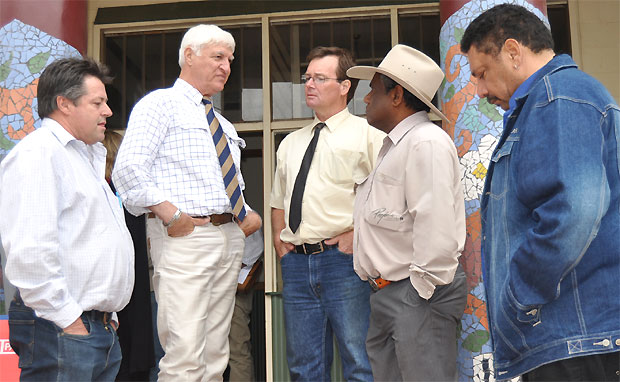
However, he actually thought the idea had some merit because it involved swapping “self smugglers” (people Mr Katter says are economic immigrants) for “real refugees” (people, he says, who are escaping persecution from a neighbouring country).
Mr Katter said if his party gained the balance of power in the Senate, they would oppose accepting any refugee boats but would still accept “genuine refugees” processed through “proper channels”.
On the subject of the Newman Government, Mr Katter said that it was “unbelievably dumb”, and said the recent sacking of 14,000 public servants was not necessary as new jobs could be created.
“If we’d been elected we would have immediately given the green light to uranium mining – which the Newman Government is doing now – and mandate the use of ethanol to create a biofuel industry. We would have also supplied power to the new mining fields in the far north,” he said.
Mr Katter said these things would have created more jobs than the government had cut, and at the same time avoided the economic slump the sackings appear to have caused.
He said he was also against the privatisation of State-owned assets and that “privatisation has been disastrous for Australia”.
“The government says these assets are their’s to sell,” he said. “But they’re not. They were paid for by the people.”
He also supported home ownership for indigenous Australians and felt alcohol restrictions on indigenous communities such as Cherbourg were racist and unjust because the same restrictions did not apply to non-indigenous Australians.
One man asked what the KAP position was on the development of an Australian software industry. The questioner said that at present, almost every computer in the country runs on Microsoft or Apple operating systems and these companies take about $120 out of Australia every time someone buys a computer.
“We could develop our own software industry using open source software like Linux,” the questioner said. “But at the moment there doesn’t seem to be anyone at any level of Government pushing the idea that we should try to make ourselves self-sufficient in this area.”
He was assured by Mr Katter that according the party’s policies, that idea would be looked on favourably if KAP gained power.
Another asked how KAP proposed to reduce the market share of Coles and Woolworths to 22 per cent each from the duopoly’s current level of 85 per cent.
Mr Katter said he thought the best model to follow was the way the US Supreme Court which had broken up Standard Oil into 33 independent companies in 1911, using the Sherman Anti-Trust Act.
A third questioner said he’d been told that when Australian banks borrow funds offshore, they’re borrowing these funds off foreign “nest egg” corporations they’ve set up themselves, and doing it at unusually high rates so they can give better dividends to shareholders while justifying high interest charges to consumers.
Mr Katter seemed genuinely surprised at this, saying he’d never heard anything like it before and asking the questioner if he could forward anything he knew about this to the party’s office so he could look into it.
“People ask me how I feel about that,” Mr McLindon said.
“I tell them I’d rather be standing for something I believe in than sitting in Parliament backing something I don’t.”
He was followed by Chris Green, who confided that he’d only had the job of membership officer for two weeks and had found that party’s membership records were “in a mess”.
However, Mr Green said immediate action was being taken to remedy this situation and promised that in future members would receive more regular communications.
After this, the Katter group decamped and so did the party’s other 25 followers.
This left the 22 South Burnett members at the meeting – including more than half a dozen who’d just signed up – to form the branch and elect office bearers, which they did in 30 minutes.











